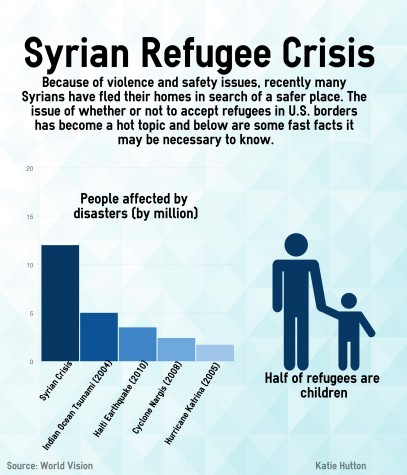United States welcoming Syrian refugees

The United States is a country of helping. In 2010, the United States helped Haiti after an earthquake by sending Marines, helicopters and ships within hours of the quake. In the 2004 Indian Ocean tsunami, which affected five million people, there was $6.25 billion donated to a U.N fund assisting the affected countries. The Syrian conflict, which affects 12 million people worldwide, involves more people than these past events and our country has demonstrated time and time again that we do not sit idle-that we help those in need and work for a better world. If the values of helping those who are oppressed or in need are to remain, we need to open our doors and accept Syrian refugees.
According to World Vision, the Syrian Refugee Crisis affects over 12 million people, more than three times the amount of the 2010 Haiti earthquake, six times the amount of Hurricane Katrina. Half of these are children, many of whom are at risk of diseases like cholera because of poor sanitation. Many other children have to work to support their families, and the risk of exploitation is much higher for these children because of unfamiliar and overcrowded conditions.
The United States is only set to accept 10,000 refugees by 2016, an incredibly small amount of the total Syrians in need of help. If the United States, a large world power, is unable to give homes to such a small amount of people it says a lot about our country–that we are unwilling to help those in need, even when it comes with virtually no financial burden.
According to US News, refugees must pay the cost of their flight to the U.S and are given a stipend of only $1000 to cover the cost of rent for three months. After the three months, the refugees are required to pay their own rent.
Refugees are required to apply for jobs like everyone else, so though there would be a slight amount of money spent on the refugees, the payment would be minimal in comparison to the help the U.S would be giving. The United States steps into conflicts whether or not the countries want it–so it is important that this time when we are wanted and needed that we help.
The United States was founded on the freedom of religion, its founders were immigrants and refugees in a sense, running from a world they were afraid of. To deny Syrian refugees would be to deny the fundamentals that this country was built upon, it would be to deny the ability to come to this country for sanctuary like many citizens’ ancestors were doing when they arrived.
There have been numerous examples throughout history where discrimination of an entire group of people is now looked back and seen as something horrible. There was the infamous discrimination of Jews in Germany, but more locally in the U.S. there was discrimination of the Irish, discrimination of African-Americans, Native Americans and Japanese. These are only some examples, but each one is known to have been a mistake on the part of the oppressors. If Syrian refugees are not allowed into the U.S. on the basis of where they are from, and discriminated once they arrive, it could be repeating a history that the U.S has been striving to move past.
Because of the recent Paris attacks and 9/11, many people are afraid to accept Syrian refugees, but those involved in the attacks were a very small minority that should in no way represent Syrians as a whole. Though the attacks were tragic, the process to accept Syrian refugees into the United States can take 18 to 24 months and is very extensive–including an interview, medical evaluation and screening process. On top of this, only 2,200 Syrians have been admitted to the United States since 2011, and the 10,000 refugees President Obama plans to admit puts the total at less than the total population of Stillwater–an amount the country will be able to hold without a problem. With all the steps being taken to guarantee the country’s safety the fear of terrorism need not exist–or at least should not outweigh the need to assist.
Many people are also against accepting Syrians because a large part of the Syrian culture is Islam. This religion clashes with the western religion of Christianity, and there has been a long history of tension between the two. To discriminate against someone on the basis of religion is something we as a country have been long against and is something we were founded against. In fact, Christianity and Islam are similar in their teaching of kindness and love, but to treat all Muslims like they are terrorists would be like treating every Christian like they are part of the KKK-ridiculous and wrong, and should not happen in a country created for the freedom of religion.
It is understandable to be afraid and confused, especially with such recent emotional disasters. It is important to look past this fear, however, and act upon what is right. The correct thing to do is to accept Syrian refugees into the United States and do what can be done to make sure they do not experience discrimination and their lives are happy.

Katie is a senior who feeds her coffee addiction by working at a local cafe in downtown Stillwater. She is an Online Editor-in-Chief and enjoys writing...


Tessa Rosa • Feb 17, 2016 at 12:35 pm
Fantastic article. It is very informative. I like that the lead is talking about the US is a country of helping and then you give examples in which we have helped. In order to sustain our name of a helping country, I agree that we should allow the Syrian refugees in. But also allow them in because they need help and we can give it to them, not just because we want to look good. Very well written Katie, your opinion is very clear.
Jared Dean • Feb 16, 2016 at 9:07 pm
This article informed me on how the US helped other countries in their times of need and what we are doing about the Syrian crisis. I liked how you acknowledged the opposing argument while still getting your point across.
Kaitlin Bloom • Feb 16, 2016 at 1:49 pm
This article portrays a lot of information in a very organized way, and you have a lot of statistics that help get your point across efficiently. It makes a very complex situation simpler, without distorting the point of the article. The infographic is also very good.
Shad Kraftson • Feb 6, 2016 at 8:49 pm
The article is well written and flows in a logical order. The research is a little broad and general but the message is clear. Both sides of the story are acknowledged and the opposing side is refuted. I am on the fence about this issue, but the article was very persuasive. Some secondary source quotes might have been helpful.